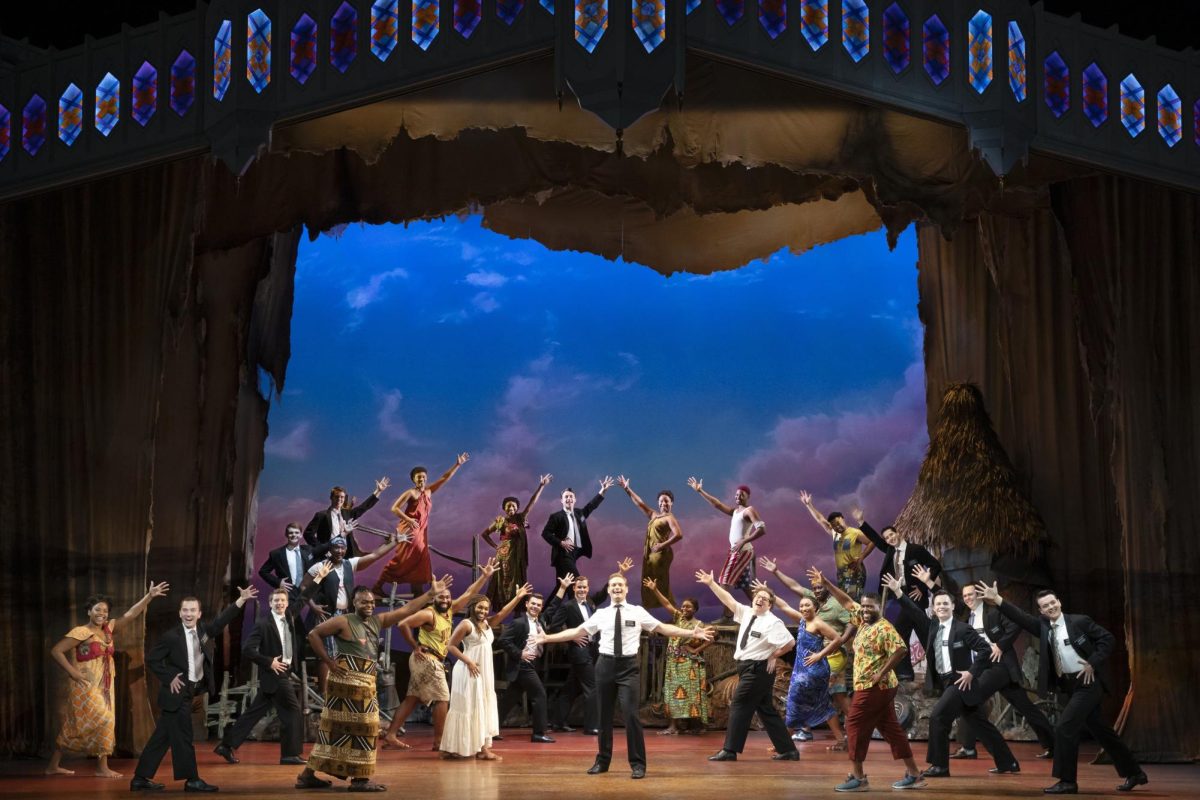As the lights went down on the opening night of “The Book of Mormon,” I thought back to New York City in 2011. I was eight years old, and a billboard bearing an image of a well-dressed, clean-cut young man holding a little blue book caught my eye in Times Square. It was an advertisement for the musical’s debut, which has since become one of the longest running shows in Broadway history.
Fast-forward a few years, and I was sitting in my seat at the Benedum Center in downtown Pittsburgh watching a troupe of actors dressed in white button-down shirts tear an entire religion to shreds through song and dance. Comedy writers Trey Parker and Matt Stone, the creators of the iconic and irreverent adult cartoon “South Park,” penned a cross-continental saga that somersaults through spectacular, side-splitting sacrilege.
The musical revolves around two young Mormon missionaries, the pious and ambitious Elder Price, who dreams of spreading the word of Jesus Christ in Orlando, and his slovenly sidekick Elder Cunningham, whose ill-informed eagerness for his faith is only matched by his sci-fi obsessions and capacity to stretch the truth. While other new missionaries jet off to Norway and Japan to seek new converts, Price and Cunningham wind up with a one-way ticket to Uganda. Price, disappointed that the Heavenly Father has ignored his prayers for Epcot Center, morosely accepts the quest to “baptize those Africans.”
The two missionaries arrive in Africa to find a village ravaged by disease, famine and poverty under the looming threat of a genital-mutilating warlord. Price attempts to approach the inhabitants with his church’s teachings, but his appeals fall on deaf ears. When Price caves to his frustration and abandons the mission, Cunningham shoulders his burden, despite the fact that he’s never even read the Book of Mormon because it’s so boring. He fills in the gaps by tweaking the theology to include Hobbits and the Starship Enterprise, and finds the villagers are more receptive to his preaching.
With a new flock of devotees dedicated to the Church of Jesus Christ of Latter-Day Saints, dreaming of the paradise called Salt Lake City, Cunningham baptizes the villagers. But his fibs backfire — the new converts stage a musical adaptation of the Book of Mormon that claims God ordered Joseph Smith to violate a frog to cure his AIDS before dying of dysentery, among other variations on the holy text. The church shuns them, but after the village invokes the wrath of God and the Kraken to scare away the warlord, the missionaries stay behind in Africa to ring doorbells, preaching Cunningham’s new sect of Mormonism.
Parker and Stone’s mockery of Mormonism is a potent parody of religion at large. Somewhere along the line, society decided that the Latter-Day Saints made the short list of religions that are cool to make fun of. The creators took full advantage of that arbitrary assessment, pulling no punches in ridiculing Mormon theology.
Without this show, audience members lacking exposure to the faith would never have known that after His resurrection, Jesus ventured to ancient Rochester, New York to preach to warring Hebrew tribes, who had arrived by boat centuries earlier. They wrote down his teachings on gold plates for the prophet Joseph Smith to dig up in his backyard in 1823. Smith gathered followers of his new religion — not showing anyone the actual plates, instead leading them on a pilgrimage to the Garden of Eden, which was in Missouri. Without “The Book of Mormon,” those heathens in the audience might not know that the true faith of Jesus Christ was founded in the good ol’ USA. Thank you, Trey and Matt, for your service to the Heavenly Father.
“The Book of Mormon” dives headfirst into a delicate balancing act, both delivering a nuanced criticism of white savior complexes and missionary colonialism while remaining outrageously offensive to all parties involved. Remember, these guys made “South Park” — they dip into their playbook and spare nobody from their taunting. In their signature no-holds-barred fashion, Parker and Stone cross the line, then pick it up and smash it over their knee.
As a recovering Catholic, the heretical humor hit close to home, making the musical even more enjoyable. The missionaries tap dance to a tune about turning their trauma off like a light switch, suppressing existential dread, crushing guilt and sexual confusion. After jumping ship from Uganda, Elder Price stars in an extravagant subterranean nightmare sequence in hell to atone for his sins. The cognitive dissonance of religious dogma, the rigidity of tradition, the dubiety of prayer, the congenital self-hatred — it all sounds pretty bad, but at least Mormons get their own planet when they die. It’s a compelling offer, I must admit.
This musical didn’t exactly have me itching to book a spring break trip to Utah. I’m glad I saw it in Pittsburgh, because I’m pretty sure it would have gotten a frostier reception at BYU. Still, maybe the next time some well-dressed zealot tries to hand me a pamphlet on a street corner in Oakland, I’ll crack it open. It could inspire the next hit Broadway musical.


